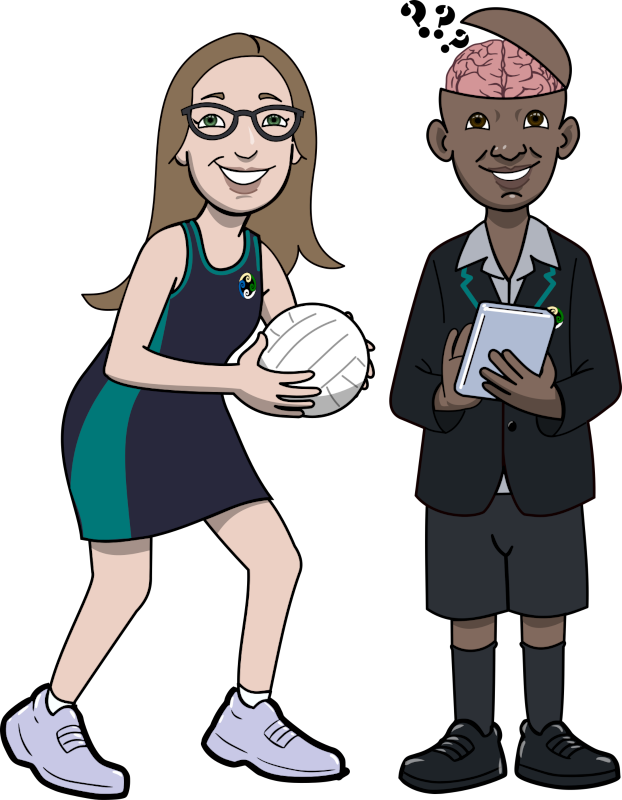10M1 English
Section outline
-
-
Opened: Monday, 25 March 2024, 12:00 AMDue: Thursday, 28 March 2024, 5:00 PM
-
Opened: Tuesday, 28 May 2024, 12:00 AMDue: Wednesday, 29 May 2024, 10:00 AM
-
Year 10 ENG CAT 2024 QuizOpened: Thursday, 21 November 2024, 11:20 AMClosed: Thursday, 21 November 2024, 1:10 PM
-
-
EXPLORE / TŪHURA learning intentions:
- We are EXPLORING now Language and literature give us insights into ourselves and othersMā te reo, ka mōhio; mā te reo ka mārama; mā te reo ka ora
- We are EXPLORING texts, linking our analysis with our Global Studies learning about the brain and how its systems help us to learn, and influence our actions and reactions.
MHJC Great Learner Learning to Learn / Ako: Brain

Kia ora...
Paearu Angitu / Success Criteria: I can/have...
- read an article describing how the brain learns and identified key structural features
- applied the ideas in the article by creating a study guide for myself, identifying study techniques and how these link to the brain's learning systems.
Hei Mahi / Activities: See Google Classroom and in-class resources
-
EXPLORE / TŪHURA learning intentions:
- We are EXPLORING now Language and literature give us insights into ourselves and othersMā te reo, ka mōhio; mā te reo ka mārama; mā te reo ka ora
- We are EXPLORING texts, linking our analysis with our Global Studies learning about the brain and how its systems help us to learn, and influence our actions and reactions.
MHJC Great Learner Learning to Learn / Ako: Brain

Kia ora...
Paearu Angitu / Success Criteria: As last week
Hei Mahi / Activities:
- Continuing our study guides, to demonstrate our understanding of the brain's learning systems and how these can be applied to a study guide.
- Grammer revision
-
Continuing from last week: Launched short story study.
Mahi Kāinga / Homework:
Ensure that you are reading your novel, as you will be referring to it in your assessment.
-
Kia ora...
Paearu Angitu / Success Criteria: I can/have...
- completed Launched character/ event activities, exploring how my understanding of how the brain works can help me to make connections with the story
- explored the concept of different readers' perspectives
Mahi Kāinga / Homework:
Literacy Book - see google classroom. -
Kia ora...
Paearu Angitu / Success Criteria: I can/have...
- explored characters in our second short text study, One Good Reason, and how my understanding of how the brain works can help me to make connections with the story
- explored the concept of different readers' perspectives
Mahi Kāinga / Homework:
Literacy Book - see google classroom. -
FOCUS / ARONGA learning intentions:
- We are FOCUSING on comparing how characters in the story take action/ respond to events
- We are FOCUSING on identifying and explaining how these character actions relate to what we have learned in Global Studies about human behaviour and the brain
See assessment task.
-
Continued from last week.
See assessment task.
-
Enter text here...
EXPLORE / TŪHURA learning intentions:
Through study of oral texts which advocate for people and the environment, we are EXPLORING how text creators manipulate the codes, conventions, and features of texts for effect and to suit their own preferences and style.
Paearu Angitu / Success Criteria:- I can structure an interpretation of a text by drawing on different perspectives, evidence from the text, and my experiences and knowledge of literature
- I can use my critical analysis of the texts to affirm or resist how a text positions me or others.
-
Continued from last week:
Hei Mahi / Activities:
- Speaking practice: quick speeches
- Interpret a range of spoken texts, identifying purpose, perspectives and how language creates meaning that may position the audience.
-
PLAN & DO / WHAKAMAHI learning intentions:
- We are PLANNING a spoken text so that we can convey our understanding of how adaptations/modifications/attitudes can create equity/equality/ action in life and to challenges faced.
For activities, see Google Classroom
-
PLAN & DO / WHAKAMAHI learning intentions:
- We are PLANNING a spoken text so that we can convey our understanding of how adaptations/modifications/attitudes can create equity/equality/ action in life and to challenges faced.
For activities, see Google Classroom
-
Continued from last week.
Please remember to review the assessment task instructions on Google Classroom
-
Practise your speeches at home for presentation in week 7 (during class time)Kia ora...
Paearu Angitu / Success Criteria: I can/have...
- completed activities to familiarise myself with how to cite sources (APA style) for a bibliography
- participated in speech practice and peer feedback
Mahi Kāinga / Homework:
-
Assessment: speech presentation week!
See google classroom for schedule. All speeches/ presentations will be presented in class time in front of your chosen audience (recommend 2-4 supporters).
-
REFLECT / WHAIWHAKAARO learning intentions:
- We are REFLECTING on our learning about equity and equality (PEH) by generating a static image that shows the barriers faced by different groups in sports, and how these can be overcome though adaptation/ modification
- The static image should meet the purpose of highlighting these issues and reflect on how people challenge the world to achieve equity and equality.
- can have multiple layers of ideas, with deeper meanings and contradictions within the text
- include structural elements can be arranged for deliberate effect to build up meaning across the text.
Awhinatanga: Positive Partnerships

Kia ora...
Paearu Angitu / Success Criteria: I can/have...
- used a creative process to experiment and innovate, making decisions that extend or elevate my ideas and personal voice
- deliberately combine written language, oral language, and other modes (e.g., gestural or visual modes) to add layers to my storytelling
-
Continued from last week:
Task: create a static image (poster) which conveys the importance of equity and equality in sport
Audience: students in Maunga Whānau
Paearu Angitu / Success Criteria: I can/have...
- used a creative process to experiment and innovate, making decisions that extend or elevate my ideas and personal voice
- deliberately combine written language, oral language, and other modes (e.g., gestural or visual modes) to add layers to my storytelling
-
Continued from last week:
Task: create a static image (poster) which conveys the importance of equity and equality in sport
Audience: students in Maunga Whānau
Paearu Angitu / Success Criteria: I can/have...
- used a creative process to experiment and innovate, making decisions that extend or elevate my ideas and personal voice
- deliberately combine written language, oral language, and other modes (e.g., gestural or visual modes) to add layers to my storytelling
-
EXPLORE / TŪHURA learning intentions:
- We are EXPLORING a range of texts to observe how people collaborate, recognising that our own bias (and the bias of the text creator) can influence how texts are interpreted and understood.
Awhinatanga: Positive Partnerships

Wänanga: The 5 Cs
Kia ora Year 10!
Paearu Angitu / Success Criteria: I can/have...
- explored different values and characteristics with my classmates in order to understand how people act and react differently to different texts and situations.
Hei Mahi / Activities - see Google Classroom
-
Kia ora Year 10!
Paearu Angitu / Success Criteria: I can/have...
- explored different values and characteristics with my classmates in order to understand how people act and react differently to different texts and situations.
Hei Mahi / Activities - see Google Classroom
-
Kia ora. Welcome to Week 3
Paearu Angitu / Success Criteria:
- I have completed a piece of reflective writing, using PEEL structure, to support our preparation for PEH assessment
- I have completed a reading comprehension task focused on inference and evaluation skills
Mahi Kāinga / Homework:
Reading Plus -
Kia ora...
Paearu Angitu / Success Criteria: I can...
- view a short video and identify key ideas
- explain how these ideas can be applied to my own experiences of team work and leadership
Hei Mahi / Activities - literacy focus: reading skills
-
Kia ora...
Paearu Angitu / Success Criteria: I can
- read to find information
- analyse texts to identify key interpersonal skills demonstrated
Literacy focus: revising rules for semicolons and dialogue
-
Kia ora...
Paearu Angitu / Success Criteria: I can
read to find information
analyse texts to identify key interpersonal skills demonstrated
Literacy focus: writing in context (argumentation)
-
Week 7
Kia ora...
Paearu Angitu / Success Criteria: I can..
- apply my knowledge of interpersonal skills to develop my own CV
- apply my knowledge of text conventions to develop my own generic cover letter
Literacy focus: writing in context (formal writing/ argumentation)
-
Catch up weeks!
Paearu Angitu / Success Criteria: I have....
- completed my CV for feedback
- completed my application letter for feedback
- continued working on my argumentation essay
Literacy focus: formal writing and technical accuracy
-
Week 9:
Catch up weeks!
Paearu Angitu / Success Criteria: I have....
- completed my CV for feedback
- completed my application letter for feedback
- continued working on my argumentation essay
Literacy focus: formal writing and technical accuracy
-
Week 10:
Paearu Angitu / Success Criteria:
- I have completed. my argumentation essay for feedback
Literacy focus: oral language and continued writing skills (argumentation)
-
Welcome back to Term 4: Tuakana Teina
Seminars!
Paearu Angitu / Success Criteria: I can
- use information to create an engaging presentation for my peers , combining visual and oral language
Literacy focus: oral language and continued writing skills
-
Seminars! Continued preparation.
Paearu Angitu / Success Criteria: I can
- use information to create an engaging presentation for my peers , combining visual and oral language
Literacy focus: oral language and continued writing skills
-
Seminars! Practising and Presenting
Paearu Angitu / Success Criteria: I can
- use information to create an engaging presentation for my peers , combining visual and oral language
Literacy focus: oral language and continued writing skills
-
Seminars! Presenting and Reflecting
Paearu Angitu / Success Criteria: I can
use information to create an engaging presentation for my peers , combining visual and oral language
reflect on my use of visual and oral language to communicate information in an engaging way
-
Seminars! Presenting and Reflecting
Paearu Angitu / Success Criteria: I can
use information to create an engaging presentation for my peers , combining visual and oral language
reflect on my use of visual and oral language to communicate information in an engaging way
Plus, literacy skills (reading unfamiliar texts) -
CAT week.
Please ensure that you use feedback to guide your revision. See Google Classroom for activities.
-
Work experience week.
Have a great time and get ready to share your experiences in week 8.
